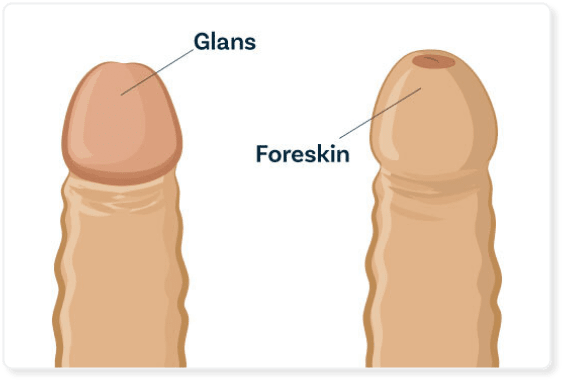What is circumcision?
Circumcision is the surgical removal of the foreskin – tissue covering the penis tip – due to various medical or non-medical reasons. There are different circumcision techniques, of which the following three are the most prevalent:
- Open circumcision: The foreskin is cut-off using a stainless steel blade.
- Laser circumcision: The urologist uses a laser beam to remove the foreskin.
- Stapler circumcision: Foreskin removal is performed using a specialized stapler device.

Why choose us?






Disease for which doctor recommends circumcision
- Phimosis: Foreskin becomes tight and can’t be pulled back
- Paraphimosis: Tight foreskin gets stuck behind the head of the penis
- Balanitis: Inflammation of the glans penis/penis tip
- Posthitis: Inflammation of the foreskin
- Balanoposthitis: Inflammation of the flans penis and the foreskin
Benefits of circumcision
- Easier penile hygiene
- Less risk of urinary tract infections
- Less risk of sexually transmitted infections, including HIV
- Prevention of foreskin issues
- Decreased risk of penile and prostate cancer
- Decreased risk of uterine cancer in sexual partner
- Easier to use a condom
Benefits of LASER circumcision
 LASER
LASER
|
 CONVENTIONAL
CONVENTIONAL
|
|---|
| Cuts & Incisions | Key-hole sized | Larger incision |
| Precision | Accurate | Manual |
| Blood Loss | Lesser | Moderate |
| Chance of Infection | Reduced | Mild-Moderate |
| Hospital Stay | Lesser (1-2 days) | More(3-4 days) |
| Recovery | Faster (5-7 days) | Slower (15-20 days) |
FAQs
Possible complications of circumcision are:
- Bleeding and infection
- Urethral fistula formation or stenosis
- Injury to the glans penis
- Excessive or too little skin removal
- Epidermal cyst
- Adhesion or keloid formation due to scarring
You should consult medical specialists like a urologist or general surgeon for adult male circumcision, but obstetricians can perform circumcision in infants, as circumcision complications are more common after non-healthcare professionals like mohels and priests perform surgery.
Generally, infancy is a more ideal time to undergo circumcision as it involves less pain and easier recovery, but circumcision is an elective procedure and can be safely performed at any age.
Generally, advanced circumcision procedures like stapler circumcision and laser circumcision are preferred over open circumcision surgery, but your doctor will decide the best procedure for you after a thorough diagnosis and physical examination.
Most patients recover completely within a couple of weeks, but you should get approval from your circumcision surgeon before starting strenuous activities like weight lifting, aerobic exercises, jogging, bicycle riding, etc.
Where We Treat Circumcision-
- Circumcision in Ahmedabad
- Circumcision in Bangalore
- Circumcision in Bhubaneswar
- Circumcision in Chandigarh
- Circumcision in Chennai
- Circumcision in Coimbatore
- Circumcision in Dehradun
- Circumcision in Delhi
- Circumcision in Hyderabad
- Circumcision in Indore
- Circumcision in Jaipur
- Circumcision in Kochi
- Circumcision in Kolkata
- Circumcision in Kozhikode
- Circumcision in Lucknow
- Circumcision in Madurai
- Circumcision in Mumbai
- Circumcision in Nagpur
- Circumcision in Patna
- Circumcision in Pune
- Circumcision in Raipur
- Circumcision in Ranchi
- Circumcision in Thiruvananthapuram
- Circumcision in Vijayawada
- Circumcision in Visakhapatnam















